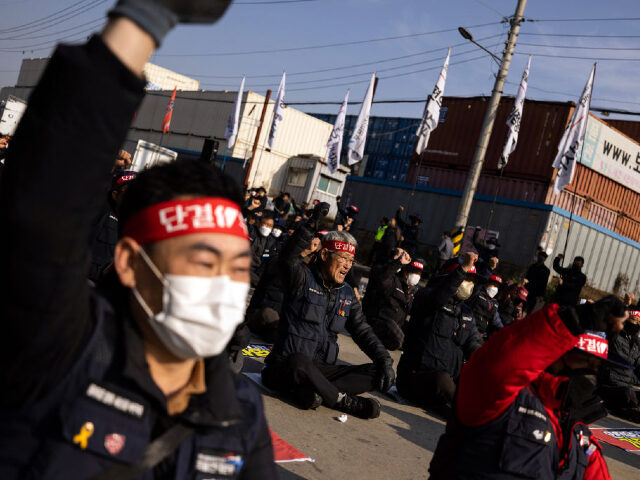The Korean Confederation of Trade Unions (KCTU), which represents the interest of unionized workers in a variety of fields in South Korea, is planning a nationwide strike for Tuesday in solidarity with an ongoing truckers’ strike the ruling conservative political party has denounced as unpatriotic.
KCTU members flooded the streets of the country’s largest cities, Seoul and Busan, on Saturday to protest conservative President Yoon Suk-yeol issuing an executive order a week ago using his legal powers to force cement truckers back to work or face exorbitant fines and potential prison time.
Korean truckers began a strike on November 24 in response to what they say are unlivable working conditions as the prices of diesel and basic goods decimate their wages. The truckers are particularly urging the government, according to the Reuters news agency, to expand a program currently in place on a small scale known as the “Safe Freight Rate,” which creates a minimum wage for truckers that they say will help offset inflation and fuel costs.
Reuters estimates that 25,000 truckers were initially part of the strike and, as per government documentation, cost the country $1.2 billion in lost shipments in one week. The back-to-work executive order affects an estimated 2,500 cement truckers.
As of Saturday, the Associated Press reported that port traffic was at about 81 percent, not totally recovered but greatly improved following Yoon’s executive order.
“A failure to comply without “justifiable reason” is punishable by up to three years in jail or a maximum fine of 30 million won ($22,400),” the AP reported.
While many have returned to work after the executive order was passed – and the government avoided a last-minute railway strike last week – the KCTU has reportedly decided to launch a national campaign on behalf of the truckers by adding its legions of workers to the strike.
South Korea’s JoongAng Ilbo reported on Sunday that the KCTU organized a protest in front of the Korean National Assembly the day before, welcoming speakers representing the trucker movement.
“The government is trying to put a leash on cargo workers to force a slave’s life with their livelihoods as hostage,” Lee Bong-joo, the head of a group called Cargo Truckers Solidarity, said at the Seoul rally, according to JoongAng Ilbo.”
Lee referred to the executive order forcing truckers back to work as a “declaration of martial law.”
The protest in Seoul attracted about 6,000 people, the KCTU claimed, and its sister event in Busan another 4,000.
Yoon responded to the protests on Saturday and the proposed general strike to begin Tuesday by accusing truckers and other workers of holding the nation “hostage” and vowing to protect supply chains and the livelihoods of those affected by the strikes.
“Holding the people’s living and national economy hostage at this time of economic difficulty makes the survival of weak, unorganized workers harder and deprives future generations and the general public of their future jobs,” Yoon said on Sunday following a government meeting in which he reportedly discussed plans to strengthen and more directly enforce the executive order. According to Reuters, the executive order initially covered cement truckers, whose strike greatly jeopardized construction, housing, and other critical economic sectors.
“On Sunday Yoon called on government ministers to make preparations to issue a return-to-work order on such sectors as oil refining and steelmaking, where additional damage is expected,” Reuters reported, citing a presidential spokesman.
Yoon, a conservative who narrowly won the presidency in a bitter election last year, has struggled with extremely low approval ratings and opposition in the legislature that has endeavored to weaken his already challenged public image.
“I cannot but regard this planned strike as a politically motivated action, rather than one aimed at representing the workers’ rights,” Yoon said on Sunday, suggesting the truckers and KCTU in general was working to the benefit of leftist opposition parties.
The South Korean news agency Yonhap accused Yoon of going even further and accusing the truckers of working to benefit communist North Korea, with which South Korea has been at war for over 70 years.
“It’s the same as North Korea’s nuclear threat,” Yonhap claimed Yoon said of the truckers in private, citing anonymous “officials.” “If we bow to illegal actions and violence, the vicious cycle will continue.”
“Yoon made the comparison during a recent closed-door meeting with his aides, saying the country would not be facing the threat of North Korea’s nuclear weapons program it is today had it dealt with Pyongyang under a no nuclear weapons principle,” Yonhap claimed, citing “multiple presidential officials” – implying someone in the Blue House, the presidential offices, wanted the comparison to leak.
Yonhap further quoted an anonymous Yoon official questioning the patriotism of the truckers.
“It’s doubtful whether the KCTU is carrying out labor union activities that conform with the identity of our country and people,” the official allegedly said directly to Yonhap. Others in the Yoon administration have publicly referred to the strikers as a “labor aristocracy.”
Speaking to Reuters, some of the striking truckers insisted that they would not be in a situation of damaging the country’s economy if they did not feel it necessary for their families’ survival.
“Our money is stretched to eat and live for a month. Labour aristocracy? That is nonsense,” a 63-year-old trucker identified as Kim Young-chan told Reuters. Kim insisted to the Korean people that the truckers were not “the enemy” and “loyal to our country,” but could not survive under current circumstances.
“Kim said high diesel prices mean their lives are no better than in June, when they went on an eight-day strike. He earns about 3 million won ($2,300) per month, far less than last year because diesel prices have nearly doubled,” Reuters relayed, noting that, Kim said his retired wife had to take odd jobs to feed the family such as cooking and cleaning.

COMMENTS
Please let us know if you're having issues with commenting.